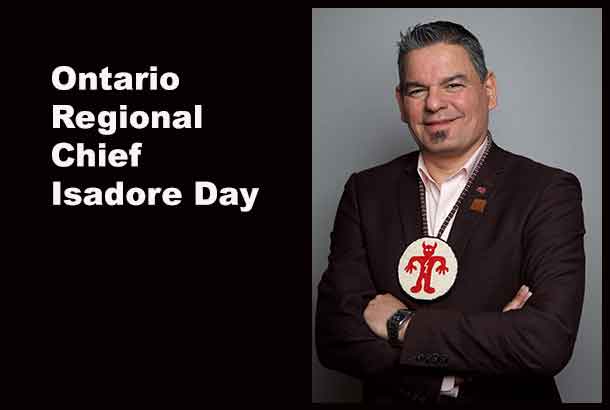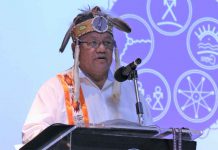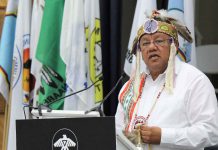 Chiefs of Ontario United on Urgent Issues; Unanimous on Sovereign Wealth Generation; and Moving Forward on Nation-to-Nation Engagement with Provincial and Federal Governments Following Three Days of Assembly and Meetings in Ottawa and Gatineau
Chiefs of Ontario United on Urgent Issues; Unanimous on Sovereign Wealth Generation; and Moving Forward on Nation-to-Nation Engagement with Provincial and Federal Governments Following Three Days of Assembly and Meetings in Ottawa and Gatineau
OTTAWA – For the past three days, a Special Chiefs Assembly (SCA) on Housing, Infrastructure and Energy was held in Gatineau, followed by a lobby day with Ministers on Parliament Hill. The focus of this week’s SCA has been on pressing priorities; short and long term actions; and our relationship with the provincial and federal governments, as well with as the Assembly of First Nations.
Our SCA was held on the Quebec side of the Ottawa River, which is very significant in terms of the fact that Our Peoples have lived here for thousands of years – long before the colonial borders established 150 years ago. Traditional Algonquin territory encompasses most of what is modern day eastern Ontario and western Quebec. The wealth of these eastern lands created Canada — the four original provinces of Ontario, Quebec, Nova Scotia and New Brunswick.
On Tuesday, we had a fulsome discussion with National Chief Perry Bellegarde. He told us about the very important nation-to-nation work that the AFN is doing on behalf of all our Nations and Peoples. As a member of the AFN Executive, I am very aware of the many portfolios that all the Regional Chiefs are involved in. In March, I provided a quarterly report to the Chiefs which detailed all the high level, and committee work, at the AFN.
However, we made it clear to the National Chief that the AFN is failing at communicating their work to our regions and our Chiefs. In order for the AFN to do nation-to-nation work with the federal government, all of our Nations must be fully informed and involved every step of the way. To paraphrase the National Chief, he works for, and is responsible to, the 634 Chiefs across Canada.
As Canada celebrates 150 years of nationhood, the Original Peoples of this land are still struggling to become equals – equals as citizens, equals in education and child care, and equals in sharing prosperity. The most tragic example of 150 years of colonialism and institutional racism is the fact that far too many of our children cannot celebrate life. Far too many of our children are taken from their families, more than at the height of the residential school system.
Regrettably, the legacy of Residential Schools is compounded by the fact that there is a serious disconnect with the bureaucrats who, for the most part, control our lives. Our Peoples are – simply put — held hostage to a bureaucracy that does not respond to our needs in a timely manner. Last month, the AFN executive heard from a senior Liberal official that there are far too many bureaucrats who still maintain a colonial mindset. Not only does this attitude go directly against the current government’s mandate, it still remains as the most significant barrier that must be removed.
Yesterday, I had the opportunity to address the nearly 70 MPs and Ministers that make up the Ontario federal caucus. In fact, INAC Minister Carolyn Bennett; Health Minister Jane Philpott; and ESDC Minister Patty Hajdu were in attendance. I told them that Justice Minister Jody Wilson-Raybould is without a doubt the most powerful Indigenous federal cabinet minister in the history of this country.
Minister Wilson Raybould-has been tasked with ensuring that the Liberal government’s nation-to-nation approach is fully implemented. The Joint Cabinet Working Group review of all legislation that impacts upon Indigenous Peoples is a very critical piece of work in order to level the playing field and develop a true nation-to-nation relationship.
During our lobby day with Ministers and Deputy-Ministers today, our Chiefs are pushing for action and results on urgent priorities, which include a new fiscal relationship that will ensure a long-term predictable, sustainable flow of funding to our communities. There still has not been any communication on when the 20-year-old 2 per cent funding cap will be lifted. This has resulted in a $30 billion funding loss that has greatly contributed to the poverty and despair in many of our communities.
Ultimately, First Nations need to control their own governments and bureaucracies, which include our own education and health authorities. Breaking free from the chains of the Indian Act is the only sure road towards creating self-sufficient, self-governing happy, healthy communities.
The collective action and power of our Chiefs, Youth and Elders is undeniable.
In the days and weeks to come, there will be much follow-up in terms of acting on this week’s resolutions and advocacy efforts. I look forward to reporting back on our progress — just a little over a month from now – at the All Ontario Chiefs Conference, June 13-15, at Lac Seul First Nation.
The Chiefs of Ontario is an advocacy forum, and a secretariat for collective decision making, action, and advocacy for the 133 First Nation communities located within the boundaries of the province of Ontario, Canada.
Chief Isadore Day
Ontario Regional Chief



